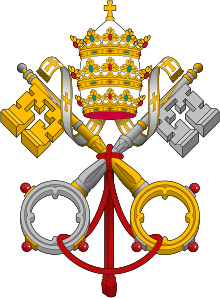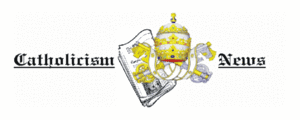Introduction The Catholic Church, also known as the Roman Catholic Church, is the largest Christian church, with 1.28 to 1.39 billion baptized Catholics worldwide as of 2024. It is among the world's oldest and largest international institutions and has played a prominent role in the history and development of Western civilization. The church consists of 24 sui iuris churches, including the Latin Church and 23 Eastern Catholic Churches, which comprise almost 3,500 dioceses and eparchies located around the world. The pope, who is the bishop of Rome, is the chief pastor of the church. The Diocese of Rome, known as the Holy See, is the central governing authority of the church. The administrative body of the Holy See, the Roman Curia, has its principal offices in Vatican City, a small independent city-state and enclave within the Italian capital city of Rome, of which the pope is head of state. The core beliefs of Catholicism are found in the Nicene Creed. The Catholic Church teaches that it is the one, holy, catholic and apostolic church founded by Jesus Christ in his Great Commission, that its bishops are the successors of Christ's apostles, and that the pope is the successor to Saint Peter, upon whom primacy was conferred by Jesus Christ. It maintains that it practises the original Christian faith taught by the apostles, preserving the faith infallibly through scripture and sacred tradition as authentically interpreted through the magisterium of the church. The Roman Rite and others of the Latin Church, the Eastern Catholic liturgies, and institutes such as mendicant orders, enclosed monastic orders and third orders reflect a variety of theological and spiritual emphases in the church. Of its seven sacraments, the Eucharist is the principal one, celebrated liturgically in the Mass. The church teaches that through consecration by a priest, the sacrificial bread and wine become the body and blood of Christ. The Virgin Mary is venerated as the Perpetual Virgin, Mother of God, and Queen of Heaven; she is honoured in dogmas and devotions. Catholic social teaching emphasizes voluntary support for the sick, the poor, and the afflicted through the corporal and spiritual works of mercy. The Catholic Church operates tens of thousands of Catholic schools, universities and colleges, hospitals, and orphanages around the world, and is the largest non-government provider of education and health care in the world. Among its other social services are numerous charitable and humanitarian organizations. (Full article...) Selected article
 Vix Pervenit: On Usury and Other Dishonest Profit was an encyclical, promulgated by Pope Benedict XIV on November 1, 1745, which condemned the practice of charging interest on loans as usury. Because the encyclical was addressed to the Bishops of Italy, it is generally not considered ex cathedra. The Holy Office applied the encyclical to the whole of the Roman Catholic Church on July 29, 1836, during the reign of Pope Gregory XVI. The encyclical codified Church teachings which date back to early ecumenical councils, at a time when scholastic philosophy (which did not regard money as a productive input) was increasingly coming into conflict with capitalism. Though never formally retracted, the encyclical's relevance has faded as the Church retreated from actively enforcing its social teachings in the financial sphere, and as the practice of charging interest on loans became almost universally accepted—legally and ethically.
Selected image
 Credit: Stanislav Traykov
The Pietà (pl. same; Italian for pity) is a subject in Christian art depicting the Virgin Mary cradling the dead body of Jesus, most often found in sculpture. As such, it is a particular form of the devotional theme of Our Lady of Sorrows, and also a scene from the Passion of Christ. Selected biography
 Henry de Lichton (de Lychtone, Leighton) (d. 1440), was a medieval Scottish prelate and diplomat, who, serving as Bishop of Moray (1414–1422) and Bishop of Aberdeen (1422–1440), became a significant patron of the church, a cathedral builder and a writer. He also served King James I of Scotland as a diplomat in England, France and Italy. He was born in the diocese of Brechin (probably Angus) somewhere between 1369 and 1379 to Henry and Janet Lichton. He was exceptionally well educated for his time, attending the University of Orléans and possibly the University of St Andrews, earning licentiates in civil law and canon law, a bachelorate in canon law and a doctorate in canon law, all achieved between 1394 and 1415; he attained an additional doctorate — in civil law — by 1436. Lichton followed an ecclesiastical career simultaneously with his studies. The first notice of this career comes in 1392, when he was vicar of Markinch in Fife, a vicariate of St Andrews Cathedral Priory.
Did you know...
Related portalsFeast Day of August 8
Selected quoteNews
SubcategoriesTopics
The Holy Bible:
Particular Churches (grouped by liturgical rite):
Things you can do
External resourcesWikiProjectsAssociated WikimediaThe following Wikimedia Foundation sister projects provide more on this subject:
Discover Wikipedia using portals |



































